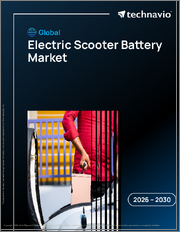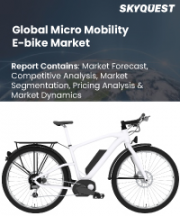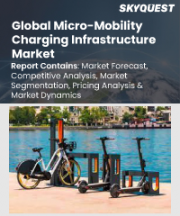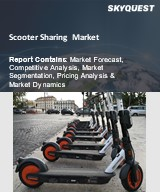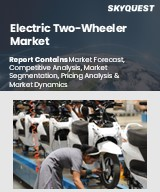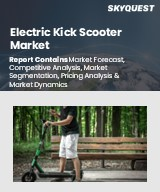
|
시장보고서
상품코드
1765196
셀프 밸런싱 스쿠터 시장Self Balancing Scooters |
||||||
셀프 밸런싱 스쿠터 세계 시장은 2030년까지 28억 달러에 이를 전망
2024년에 21억 달러로 추정되는 셀프 밸런싱 스쿠터 세계 시장은 2024-2030년 CAGR 4.5%로 성장하여 2030년에는 28억 달러에 이를 것으로 예측됩니다.
미국 시장은 5억 7,480만 달러, 중국은 CAGR4.2%로 성장 예측
미국의 셀프 밸런싱 스쿠터 시장은 2024년에 5억 7,480만 달러로 추정됩니다. 세계 2위 경제대국인 중국은 분석 기간인 2024-2030년 CAGR 4.2%로 2030년까지 4억 4,060만 달러 규모에 이를 것으로 예측됩니다. 기타 주목해야 할 지역별 시장으로서는 일본과 캐나다가 있으며, 분석 기간중 CAGR은 각각 4.1%와 3.7%를 보일 것으로 예측됩니다. 유럽에서는 독일이 CAGR 3.4%를 보일 전망입니다.
세계의 셀프 밸런싱 스쿠터 시장 - 주요 동향과 촉진요인 정리
셀프 밸런싱 스쿠터가 도심에서 인기를 끌고 있는 이유는 무엇일까?
호버보드라고도 불리는 셀프 밸런싱 스쿠터는 도심 속 편리하고 친환경적인 교통수단으로 인기를 끌고 있습니다. 이 스쿠터는 자이로 센서와 가속도계를 사용하여 균형을 유지하며, 수동 조작 없이도 부드러운 승차감을 제공합니다. 도시화, 교통 혼잡, 환경 문제에 대한 관심이 높아지면서 초소형 모빌리티 솔루션의 인기가 높아지면서 셀프 밸런싱 스쿠터에 대한 수요가 증가하고 있습니다. 단거리 이동, 마지막 1마일 연결, 레크리에이션 목적으로 널리 사용되어 기존 교통 수단에 대한 실용적이고 비용 효율적인 대안을 제공합니다. 지속 가능한 교통수단과 탄소 발자국 감소에 대한 관심이 높아지면서 특히 환경에 민감한 소비자와 도시 통근자 사이에서 셀프 밸런싱 스쿠터의 채택을 더욱 촉진하고 있습니다.
기술의 발전은 어떻게 셀프 밸런싱 스쿠터의 성능을 향상시키고 있는가?
기술의 발전은 스쿠터의 성능, 안전성 및 매력을 향상시키는 데 중요한 역할을합니다. 더 높은 에너지 밀도와 빠른 충전 기능을 갖춘 리튬 이온 배터리와 같은 배터리 기술의 혁신은 이러한 스쿠터의 주행 거리와 주행 효율을 증가시키고 있습니다. 첨단 센서, 자이로스코프, 모터 제어 시스템의 통합으로 안정성, 반응성 및 라이더의 안전성이 향상되었으며, 블루투스 연결, GPS 추적, 모바일 앱 통합을 갖춘 스마트 커넥티드 스쿠터의 출현은 사용자에게 경로 최적화, 도난 방지, 원격 진단 등의 추가 기능을 제공합니다. 등의 추가 기능을 사용자에게 제공합니다. 또한, 가볍고 접을 수 있는 디자인의 개발로 셀프 밸런싱 스쿠터는 휴대가 간편하고 사용하기 쉬워져 도시 통근자 및 여행자의 요구에 부응하고 있습니다. 이러한 기술적 진보로 인해 다양한 소비자층에서 셀프 밸런싱 스쿠터 시장 잠재력이 확대되고 있습니다.
어떤 시장 세분화가 셀프 밸런싱 스쿠터 채택을 주도하고 있는가?
셀프 밸런싱 스쿠터 시장은 유형, 용도, 최종 사용자, 지역별로 분류됩니다. 셀프 밸런싱 스쿠터의 유형에는 1륜 스쿠터와 이륜 스쿠터가 있으며, 안정성과 사용 편의성으로 인해 이륜 스쿠터가 가장 널리 채택되고 있습니다. 용도는 개인 이동수단 및 레크리에이션용부터 배달 서비스, 경비 순찰 등 상업용에 이르기까지 다양합니다. 편리하고 지속 가능한 교통수단에 대한 수요가 증가함에 따라, 특히 마지막 1마일 연결 및 단거리 이동을 위한 개인용 모빌리티 부문이 시장에서 큰 비중을 차지하고 있습니다. 최종 사용자에는 밀레니얼 세대, Z세대, 전문가가 포함되며, 혁신적이고 친환경적인 모빌리티 솔루션을 선호하는 밀레니얼 세대가 가장 큰 소비자 그룹입니다. 지리적으로는 북미와 유럽이 높은 가처분 소득과 선진화된 도시 인프라로 인해 시장을 주도하고 있지만, 아시아태평양은 급속한 도시화와 전기 모빌리티 솔루션의 채택 증가로 인해 고성장 시장으로 부상하고 있습니다.
셀프 밸런싱 스쿠터 시장의 주요 성장 촉진요인은 무엇인가?
셀프 밸런싱 스쿠터 시장의 성장은 초소형 모빌리티 솔루션에 대한 수요 증가, 배터리 및 모터 제어 시스템의 기술 발전, 지속 가능한 도시 교통에 대한 관심 증가 등 여러 가지 요인에 기인합니다. 안전 기능이 강화된 스마트 커넥티드 셀프 밸런싱 스쿠터의 개발은 도시 통근자 및 레크리에이션 사용자들에게 보급을 촉진하고 있습니다. 교통 체증과 이산화탄소 배출 감소에 대한 관심이 높아지면서 친환경 대체 교통수단에 대한 수요가 증가하고 있으며, 스마트 시티와 도시 환경에서 셀프 밸런싱 스쿠터에 대한 기회가 창출되고 있습니다. 스쿠터 공유 플랫폼과 렌탈 서비스의 인기가 높아지면서 셀프 밸런싱 스쿠터 시장 범위가 확대되고 있습니다. 또한, 고속, 장거리, 경량 스쿠터 설계를 위한 연구개발에 대한 투자가 증가하고 있는 것도 시장 성장을 더욱 촉진하고 있습니다.
부문
부문(셀프 밸런싱 스쿠터)
조사 대상 기업 예
- Aha Tech Pty Limited
- Best Electric Hoverboard
- DailyHover.com
- Freego India
- Hangzhou CHIC Intelligent Technology Co., Ltd.
- Inventist, Inc.
- PATA Electric Company
- Razor USA LLC.
- Segway-Ninebot
- Skque Products
AI 통합
검증 된 전문가 컨텐츠와 AI툴에 의해 시장 정보와 경쟁 정보를 변혁합니다.
Global Industry Analysts는 일반적인 LLM나 업계별 SLM 쿼리에 따르는 대신에, 비디오 기록, 블로그, 검색 엔진 조사, 대량 기업, 제품/서비스, 시장 데이터 등, 전 세계 전문가로부터 수집한 컨텐츠 리포지토리를 구축했습니다.
관세 영향 계수
Global Industry Analysts는 본사의 국가, 제조거점, 수출입(완제품 및 OEM)을 기반으로 기업의 경쟁력 변화를 예측했습니다. 이러한 복잡하고 다면적인 시장 역학은 수익원가(COGS) 증가, 수익성 감소, 공급망 재편 등 미시적 및 거시적 시장 역학 중에서도 특히 경쟁사들에게 영향을 미칠 것으로 예측됩니다.
목차
제1장 조사 방법
제2장 주요 요약
- 시장 개요
- 주요 기업
- 시장 동향과 촉진요인
- 세계 시장 전망
제3장 시장 분석
- 미국
- 캐나다
- 일본
- 중국
- 유럽
- 프랑스
- 독일
- 이탈리아
- 영국
- 기타 유럽
- 아시아태평양
- 기타 지역
제4장 경쟁
LSH 25.07.16Global Self Balancing Scooters Market to Reach US$2.8 Billion by 2030
The global market for Self Balancing Scooters estimated at US$2.1 Billion in the year 2024, is expected to reach US$2.8 Billion by 2030, growing at a CAGR of 4.5% over the analysis period 2024-2030.
The U.S. Market is Estimated at US$574.8 Million While China is Forecast to Grow at 4.2% CAGR
The Self Balancing Scooters market in the U.S. is estimated at US$574.8 Million in the year 2024. China, the world's second largest economy, is forecast to reach a projected market size of US$440.6 Million by the year 2030 trailing a CAGR of 4.2% over the analysis period 2024-2030. Among the other noteworthy geographic markets are Japan and Canada, each forecast to grow at a CAGR of 4.1% and 3.7% respectively over the analysis period. Within Europe, Germany is forecast to grow at approximately 3.4% CAGR.
Global Self Balancing Scooters Market - Key Trends and Drivers Summarized
Why Are Self-Balancing Scooters Gaining Popularity in Urban Areas?
Self-balancing scooters, also known as hoverboards, are becoming increasingly popular as a convenient and eco-friendly mode of transportation in urban areas. These scooters use gyroscopic sensors and accelerometers to maintain balance and provide a smooth riding experience without the need for manual control. The rising popularity of micro-mobility solutions, driven by increasing urbanization, traffic congestion, and environmental concerns, is boosting the demand for self-balancing scooters. They are widely used for short-distance travel, last-mile connectivity, and recreational purposes, offering a practical and cost-effective alternative to traditional transportation modes. The growing focus on sustainable transportation and reducing carbon footprints is further driving the adoption of self-balancing scooters, particularly among environmentally conscious consumers and urban commuters.
How Are Technological Advancements Enhancing the Performance of Self-Balancing Scooters?
Technological advancements are playing a crucial role in enhancing the performance, safety, and appeal of self-balancing scooters. Innovations in battery technology, such as lithium-ion batteries with higher energy density and faster charging capabilities, are extending the range and operational efficiency of these scooters. The integration of advanced sensors, gyroscopes, and motor control systems is improving stability, responsiveness, and rider safety. The emergence of smart and connected scooters with Bluetooth connectivity, GPS tracking, and mobile app integration is providing users with additional features such as route optimization, anti-theft protection, and remote diagnostics. Furthermore, the development of lightweight and foldable designs is making self-balancing scooters more portable and user-friendly, catering to the needs of urban commuters and travelers. These technological advancements are expanding the market potential of self-balancing scooters across various consumer segments.
Which Market Segments Are Leading the Adoption of Self-Balancing Scooters?
The self-balancing scooter market is segmented by type, application, end-user, and region. Types of self-balancing scooters include single-wheel and dual-wheel scooters, with dual-wheel variants being the most widely adopted due to their stability and ease of use. Applications range from personal mobility and recreational use to commercial applications such as delivery services and security patrolling. The personal mobility segment, particularly for last-mile connectivity and short-distance travel, holds a significant share of the market due to the increasing demand for convenient and sustainable transportation options. End-users include millennials, Gen Z consumers, and professionals, with millennials being the largest consumer group due to their preference for innovative and eco-friendly mobility solutions. Geographically, North America and Europe lead the market due to high disposable incomes and advanced urban infrastructure, while Asia-Pacific is emerging as a high-growth market driven by rapid urbanization and increasing adoption of electric mobility solutions.
What Are the Key Drivers of Growth in the Self-Balancing Scooter Market?
The growth in the self-balancing scooter market is driven by several factors, including the rising demand for micro-mobility solutions, technological advancements in battery and motor control systems, and the increasing focus on sustainable urban transportation. The development of smart and connected self-balancing scooters with enhanced safety features is boosting their adoption among urban commuters and recreational users. The emphasis on reducing traffic congestion and carbon emissions is driving the demand for eco-friendly transportation alternatives, creating opportunities for self-balancing scooters in smart cities and urban environments. The growing popularity of scooter-sharing platforms and rental services is expanding the market reach of self-balancing scooters. Additionally, the increasing investments in R&D for high-speed, long-range, and lightweight scooter designs are further supporting market growth.
SCOPE OF STUDY:
The report analyzes the Self Balancing Scooters market in terms of units by the following Segments, and Geographic Regions/Countries:
Segments:
Segment (Self Balancing Scooters)
Geographic Regions/Countries:
World; United States; Canada; Japan; China; Europe (France; Germany; Italy; United Kingdom; and Rest of Europe); Asia-Pacific; Rest of World.
Select Competitors (Total 43 Featured) -
- Aha Tech Pty Limited
- Best Electric Hoverboard
- DailyHover.com
- Freego India
- Hangzhou CHIC Intelligent Technology Co., Ltd.
- Inventist, Inc.
- PATA Electric Company
- Razor USA LLC.
- Segway-Ninebot
- Skque Products
AI INTEGRATIONS
We're transforming market and competitive intelligence with validated expert content and AI tools.
Instead of following the general norm of querying LLMs and Industry-specific SLMs, we built repositories of content curated from domain experts worldwide including video transcripts, blogs, search engines research, and massive amounts of enterprise, product/service, and market data.
TARIFF IMPACT FACTOR
Our new release incorporates impact of tariffs on geographical markets as we predict a shift in competitiveness of companies based on HQ country, manufacturing base, exports and imports (finished goods and OEM). This intricate and multifaceted market reality will impact competitors by increasing the Cost of Goods Sold (COGS), reducing profitability, reconfiguring supply chains, amongst other micro and macro market dynamics.
TABLE OF CONTENTS
I. METHODOLOGY
II. EXECUTIVE SUMMARY
- 1. MARKET OVERVIEW
- Influencer Market Insights
- Tariff Impact on Global Supply Chain Patterns
- Self Balancing Scooters - Global Key Competitors Percentage Market Share in 2025 (E)
- Global Economic Update
- Competitive Market Presence - Strong/Active/Niche/Trivial for Players Worldwide in 2025 (E)
- 2. FOCUS ON SELECT PLAYERS
- 3. MARKET TRENDS & DRIVERS
- Rising Popularity of Micro-Mobility Solutions Drives Demand for Self-Balancing Scooters
- Increasing Urbanization and Traffic Congestion Expands Addressable Market for Self-Balancing Scooters
- Technological Advancements in Battery Efficiency and Motor Control Propel Innovation
- Growth of Smart City Initiatives Strengthens Business Case for Electric Scooters
- Rising Adoption of Self-Balancing Scooters for Last-Mile Connectivity Enhances Market Competitiveness
- Focus on Reducing Carbon Footprint and Promoting Sustainable Transportation Spurs Market Growth
- Emergence of Smart and Connected Self-Balancing Scooters Generates New Market Opportunities
- Increasing Demand for Recreational and Leisure Activities Boosts Market Expansion
- Shift Towards Lightweight and Foldable Scooter Designs Expands Market Reach
- Growing Use of Advanced Sensors and Gyroscopes in Scooter Stabilization Drives Market Innovation
- Focus on Enhancing Rider Safety and Comfort Through Improved Features Strengthens Market Demand
- Expansion of Self-Balancing Scooter Rental and Sharing Platforms Creates New Revenue Streams
- Focus on Targeting Millennials and Gen Z Consumers Propels Market Adoption
- 4. GLOBAL MARKET PERSPECTIVE
- TABLE 1: World Self Balancing Scooters Market Analysis of Annual Sales in US$ Thousand for Years 2015 through 2030
- TABLE 2: World Recent Past, Current & Future Analysis for Self Balancing Scooters by Geographic Region - USA, Canada, Japan, China, Europe, Asia-Pacific and Rest of World Markets - Independent Analysis of Annual Sales in US$ Thousand for Years 2024 through 2030 and % CAGR
- TABLE 3: World Historic Review for Self Balancing Scooters by Geographic Region - USA, Canada, Japan, China, Europe, Asia-Pacific and Rest of World Markets - Independent Analysis of Annual Sales in US$ Thousand for Years 2015 through 2023 and % CAGR
- TABLE 4: World 15-Year Perspective for Self Balancing Scooters by Geographic Region - Percentage Breakdown of Value Sales for USA, Canada, Japan, China, Europe, Asia-Pacific and Rest of World Markets for Years 2015, 2025 & 2030
III. MARKET ANALYSIS
- UNITED STATES
- Self Balancing Scooters Market Presence - Strong/Active/Niche/Trivial - Key Competitors in the United States for 2025 (E)
- TABLE 5: USA Recent Past, Current & Future Analysis for Self Balancing Scooters by Segment - Self Balancing Scooters - Independent Analysis of Annual Sales in US$ Thousand for the Years 2024 through 2030 and % CAGR
- TABLE 6: USA Historic Review for Self Balancing Scooters by Segment - Self Balancing Scooters Markets - Independent Analysis of Annual Sales in US$ Thousand for Years 2015 through 2023 and % CAGR
- CANADA
- TABLE 7: Canada Recent Past, Current & Future Analysis for Self Balancing Scooters by Segment - Self Balancing Scooters - Independent Analysis of Annual Sales in US$ Thousand for the Years 2024 through 2030 and % CAGR
- TABLE 8: Canada Historic Review for Self Balancing Scooters by Segment - Self Balancing Scooters Markets - Independent Analysis of Annual Sales in US$ Thousand for Years 2015 through 2023 and % CAGR
- JAPAN
- Self Balancing Scooters Market Presence - Strong/Active/Niche/Trivial - Key Competitors in Japan for 2025 (E)
- TABLE 9: Japan Recent Past, Current & Future Analysis for Self Balancing Scooters by Segment - Self Balancing Scooters - Independent Analysis of Annual Sales in US$ Thousand for the Years 2024 through 2030 and % CAGR
- TABLE 10: Japan Historic Review for Self Balancing Scooters by Segment - Self Balancing Scooters Markets - Independent Analysis of Annual Sales in US$ Thousand for Years 2015 through 2023 and % CAGR
- CHINA
- Self Balancing Scooters Market Presence - Strong/Active/Niche/Trivial - Key Competitors in China for 2025 (E)
- TABLE 11: China Recent Past, Current & Future Analysis for Self Balancing Scooters by Segment - Self Balancing Scooters - Independent Analysis of Annual Sales in US$ Thousand for the Years 2024 through 2030 and % CAGR
- TABLE 12: China Historic Review for Self Balancing Scooters by Segment - Self Balancing Scooters Markets - Independent Analysis of Annual Sales in US$ Thousand for Years 2015 through 2023 and % CAGR
- EUROPE
- Self Balancing Scooters Market Presence - Strong/Active/Niche/Trivial - Key Competitors in Europe for 2025 (E)
- TABLE 13: Europe Recent Past, Current & Future Analysis for Self Balancing Scooters by Geographic Region - France, Germany, Italy, UK and Rest of Europe Markets - Independent Analysis of Annual Sales in US$ Thousand for Years 2024 through 2030 and % CAGR
- TABLE 14: Europe Historic Review for Self Balancing Scooters by Geographic Region - France, Germany, Italy, UK and Rest of Europe Markets - Independent Analysis of Annual Sales in US$ Thousand for Years 2015 through 2023 and % CAGR
- TABLE 15: Europe 15-Year Perspective for Self Balancing Scooters by Geographic Region - Percentage Breakdown of Value Sales for France, Germany, Italy, UK and Rest of Europe Markets for Years 2015, 2025 & 2030
- FRANCE
- Self Balancing Scooters Market Presence - Strong/Active/Niche/Trivial - Key Competitors in France for 2025 (E)
- TABLE 16: France Recent Past, Current & Future Analysis for Self Balancing Scooters by Segment - Self Balancing Scooters - Independent Analysis of Annual Sales in US$ Thousand for the Years 2024 through 2030 and % CAGR
- TABLE 17: France Historic Review for Self Balancing Scooters by Segment - Self Balancing Scooters Markets - Independent Analysis of Annual Sales in US$ Thousand for Years 2015 through 2023 and % CAGR
- GERMANY
- Self Balancing Scooters Market Presence - Strong/Active/Niche/Trivial - Key Competitors in Germany for 2025 (E)
- TABLE 18: Germany Recent Past, Current & Future Analysis for Self Balancing Scooters by Segment - Self Balancing Scooters - Independent Analysis of Annual Sales in US$ Thousand for the Years 2024 through 2030 and % CAGR
- TABLE 19: Germany Historic Review for Self Balancing Scooters by Segment - Self Balancing Scooters Markets - Independent Analysis of Annual Sales in US$ Thousand for Years 2015 through 2023 and % CAGR
- ITALY
- TABLE 20: Italy Recent Past, Current & Future Analysis for Self Balancing Scooters by Segment - Self Balancing Scooters - Independent Analysis of Annual Sales in US$ Thousand for the Years 2024 through 2030 and % CAGR
- TABLE 21: Italy Historic Review for Self Balancing Scooters by Segment - Self Balancing Scooters Markets - Independent Analysis of Annual Sales in US$ Thousand for Years 2015 through 2023 and % CAGR
- UNITED KINGDOM
- Self Balancing Scooters Market Presence - Strong/Active/Niche/Trivial - Key Competitors in the United Kingdom for 2025 (E)
- TABLE 22: UK Recent Past, Current & Future Analysis for Self Balancing Scooters by Segment - Self Balancing Scooters - Independent Analysis of Annual Sales in US$ Thousand for the Years 2024 through 2030 and % CAGR
- TABLE 23: UK Historic Review for Self Balancing Scooters by Segment - Self Balancing Scooters Markets - Independent Analysis of Annual Sales in US$ Thousand for Years 2015 through 2023 and % CAGR
- REST OF EUROPE
- TABLE 24: Rest of Europe Recent Past, Current & Future Analysis for Self Balancing Scooters by Segment - Self Balancing Scooters - Independent Analysis of Annual Sales in US$ Thousand for the Years 2024 through 2030 and % CAGR
- TABLE 25: Rest of Europe Historic Review for Self Balancing Scooters by Segment - Self Balancing Scooters Markets - Independent Analysis of Annual Sales in US$ Thousand for Years 2015 through 2023 and % CAGR
- ASIA-PACIFIC
- Self Balancing Scooters Market Presence - Strong/Active/Niche/Trivial - Key Competitors in Asia-Pacific for 2025 (E)
- TABLE 26: Asia-Pacific Recent Past, Current & Future Analysis for Self Balancing Scooters by Segment - Self Balancing Scooters - Independent Analysis of Annual Sales in US$ Thousand for the Years 2024 through 2030 and % CAGR
- TABLE 27: Asia-Pacific Historic Review for Self Balancing Scooters by Segment - Self Balancing Scooters Markets - Independent Analysis of Annual Sales in US$ Thousand for Years 2015 through 2023 and % CAGR
- REST OF WORLD
- TABLE 28: Rest of World Recent Past, Current & Future Analysis for Self Balancing Scooters by Segment - Self Balancing Scooters - Independent Analysis of Annual Sales in US$ Thousand for the Years 2024 through 2030 and % CAGR
- TABLE 29: Rest of World Historic Review for Self Balancing Scooters by Segment - Self Balancing Scooters Markets - Independent Analysis of Annual Sales in US$ Thousand for Years 2015 through 2023 and % CAGR






